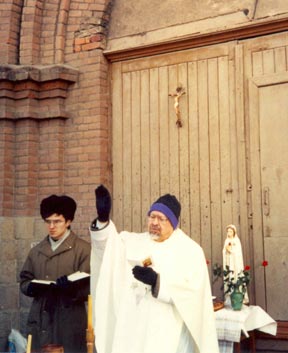
 Sullivan’s Island—Father Myron Effing visited Stella Maris Church on Sullivan’s Island recently to talk about his mission to spread Catholicism in Russia.
Sullivan’s Island—Father Myron Effing visited Stella Maris Church on Sullivan’s Island recently to talk about his mission to spread Catholicism in Russia.
There has been progress, he said, but in a country that lived without religion for so long, it takes time and patience.
When Father Myron first arrived in Valdivostok, Russia, in 1991, it had been over 50 years since the people had welcomed a priest, or any other religious figure. And at that time, it was a very small welcome.
A handful of people with long-buried, hidden ties to Catholicism banded together to reestablish their faith, and asked the Catholic Church to send someone to lead them.
Father Myron said it’s hard to imagine what it was like then. Since 1917, the Russian people had lived under Communism, which denounced the existence of God, destroyed or confiscated all churches, and forbade religious worship of any kind.
People were arrested for no reason, never to be heard from again, and Russians learned to keep their eyes down and faces grim in an effort to avoid attention.
Before the Communist revolution, Valdivostok was a large, vibrant Catholic diocese. But under Vladimir Lenin and Joseph Stalin, the beautiful port town was turned into a closed military city.
Father Myron said when he came, it was grey, dingy, and very poor.
The Roman Catholic Church had just been reestablished with the appointment of five new bishops, and Father Myron was celebrating the first Mass the people had seen in 56 years.
The pre-revolutionary church, confiscated by the Communist government, was still closed, so Mass was held on the street in front of the Cathedral of the Most Holy Mother of God.
The small group that invited the church participated, but most were intimidated by the past and afraid to join. Father Myron said they watched, curious, and kept an eye on the stern-faced government police that also stood in the crowd.
“Even when people started coming to services, they were frightened, and didn’t want their photos taken,” he said.
The priest and his assistant, Father Daniel Maurer, CJD, had their work cut out for them.
Orphans filled the street, abortions were rampant, and family life practically non-existent, with an 80 percent divorce rate.
“We don’t have that sense of family that you do here,” Father Myron explained. “There are no neighborhood churches.”
And in a congregation of about 400 parishioners, there are only about 10 intact families. Plus territories are huge, with people traveling up to three hours to attend Mass.
So far, the two priests have founded or re-founded 11 Catholic parishes in an area covering over 500,000 square miles. They also have additional priests and sisters joining the work, and parishes are slowly growing and multiplying.
In 1996, Dan Rather and Richard Threlkeld, with CBS News, did a live report on the revival of Catholicism in the Valdivostok parish.
Parishioners at Stella Maris also made a large contribution to the growth and financial support of the far-away church. In 2003, Msgr. Lawrence B. McInerny led the donation of a large organ. Now, the Russian church uses the instrument to raise funds, drawing people from all over the city to hear their concerts.
Some of the problems the church first encountered have been solved. The city is colorful and businesses are growing. Children no longer live on the street.
But problems remain. The three top ministries are outreach to orphanages, crisis pregnancy centers and hospice care.
The priests also struggle to find ways to connect the culture with liturgical events.
One way is through food. Father Myron said all Russians have gardens, so the harvest thanksgiving in the fall is important.
It’s also important that they give their members some leeway. Many parishioners celebrate Christmas and Easter twice — once as Catholics and again with family who belong to the country’s dominant religion, Russian Orthodox, he said.
One of his favorite cultural events is the blessing of the Easter feast. Everybody brings all their food to the church, lays it on long tables, and has it blessed before they break their fast.
“There’s good people here, there’s holy people, and of course, it was worse when there was no religion,” Father Myron said.
